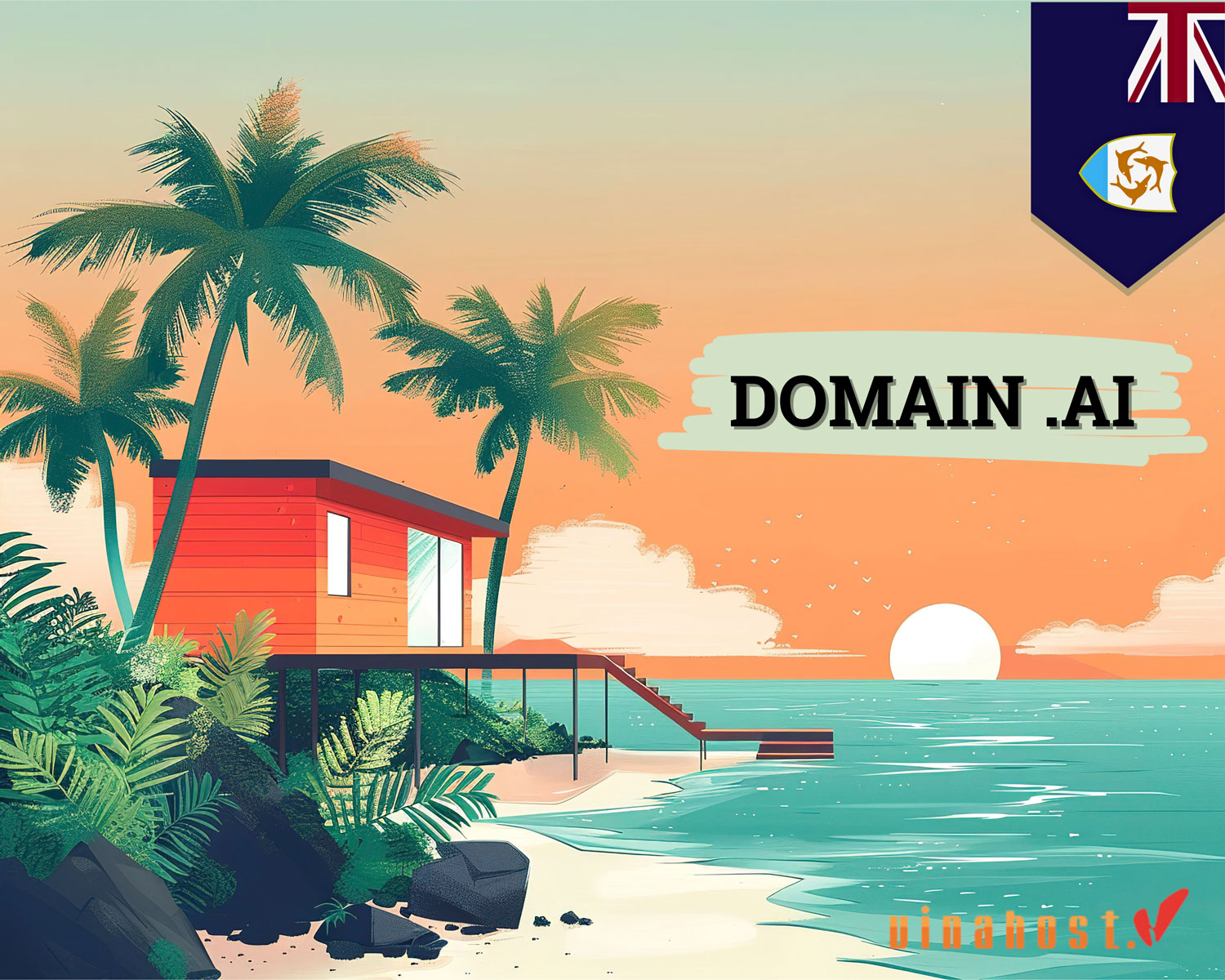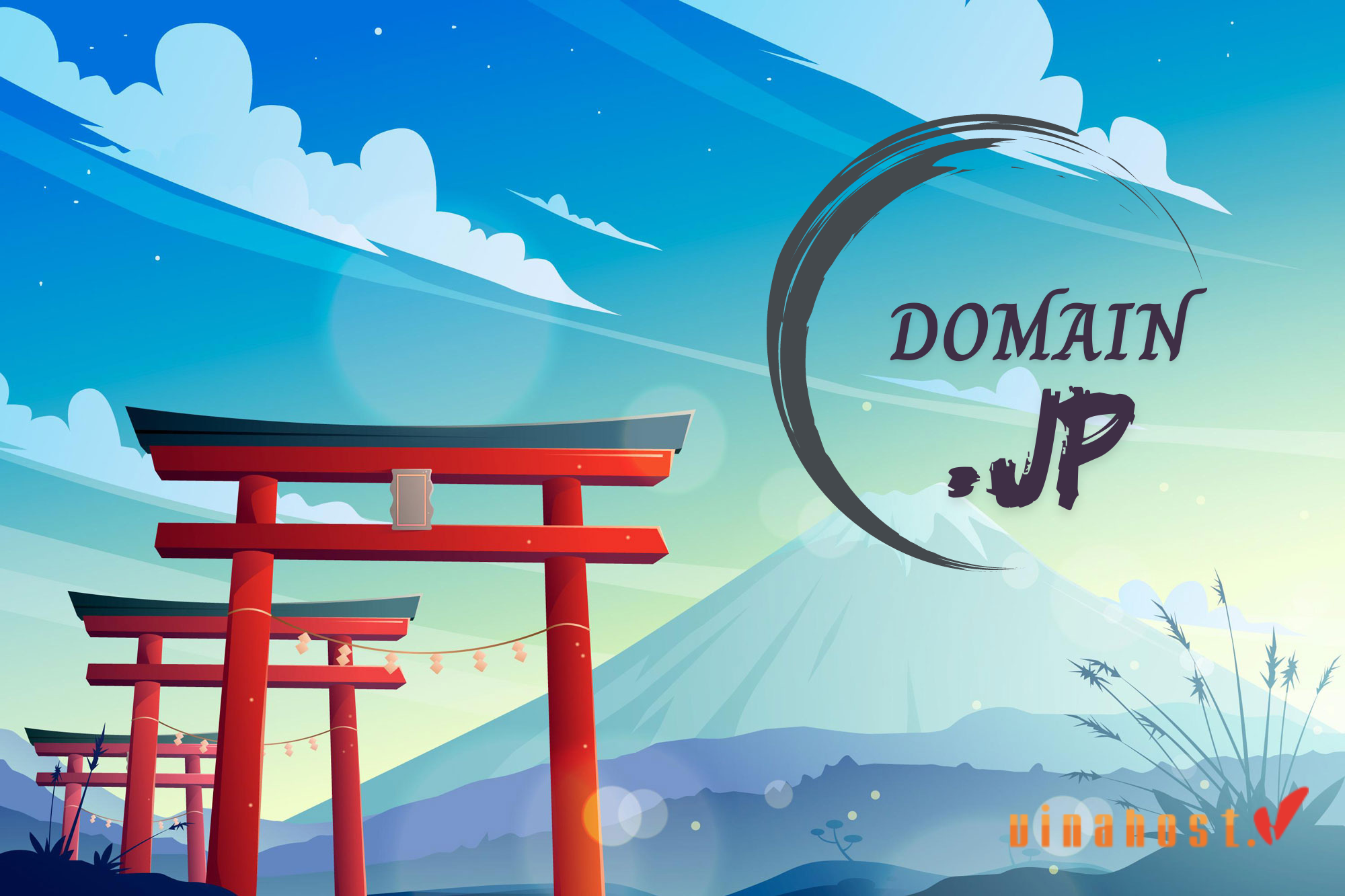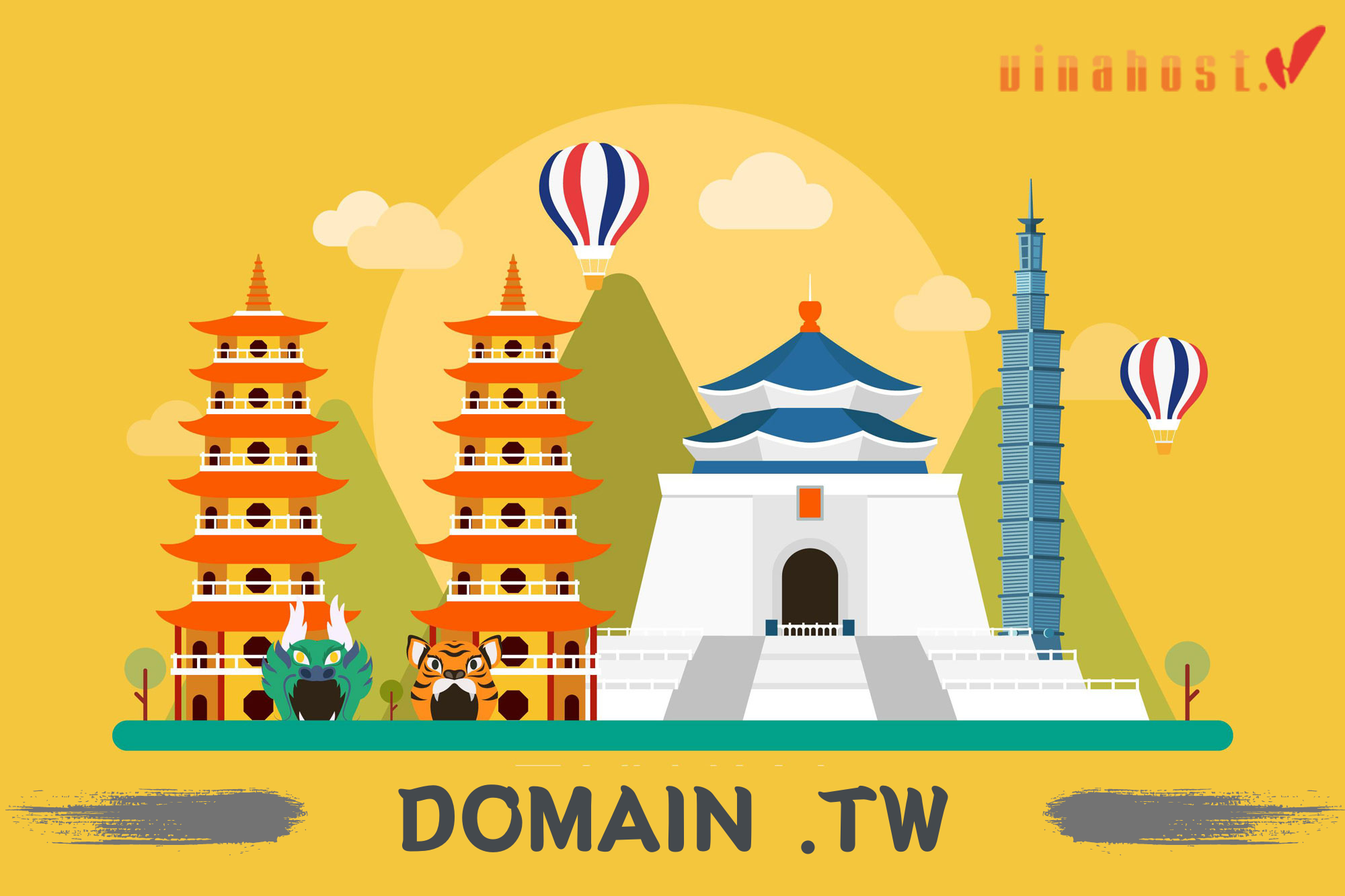What is .org domain? Among the numerous domain extensions available online, .org stands out as one of the most recognized. Before deciding if a .org domain is the right choice for your needs, it’s important to grasp its significance, benefits, and limitations. VinaHost will explore the origins and uses of the .org domain, as well as guide you through the registration process.
1. What is .org domain?
Initially, the .org domain was created to serve non-profit organizations, but over time, it has undergone many changes and developments.
The .org domain name often includes the word “organization” within its name, reflecting its original purpose. However, this barrier has been relaxed, and the regulations concerning the use of the .org domain have become more flexible.
The .org domain has become a symbol of websites that focus on community and goals beyond profit-making.
This is why .org is often the domain of choice for schools, open-source projects, and community organizations.
Following up on what a .org domain is, its continuous development over time has made it rare and expensive, especially for short and memorable names. Short domain names with three-letter combinations have become valuable assets, priced from thousands to millions of USD in the domain market. The significant increase in the number of .org domains is a clear testament to its popularity and value today.

Also Read: What is Domain & How It Impacts Your Online Presence
2. Understanding the .org Domain Extension
2.1. A Brief History of .org
Created in 1985, .org was one of the original top-level domains (TLDs) established when the Domain Name System (DNS) was implemented for the internet. It was intended to serve the non-commercial organizations that didn’t fit into the other categories which included .com for commercial, .edu for educational, .gov for U.S. governmental entities, .mil for military, and .net for network services.
Over the years, .org became synonymous with trust and credibility among internet users, making it a popular choice for various non-profit and voluntary communities. It grew to represent not just non-profit organizations but any group or individual seeking to promote a cause or idea without direct commercial gain.
The Public Interest Registry (PIR) has been managing the “.org” domain since 2003. PIR’s primary goal is to promote the development of non-profit organizations on the internet. They are committed to providing a safe and reliable environment for social organizations to operate, helping them connect with online communities and access necessary resources.
2.2. Who Manages .org Domains?
The management of .org domains is overseen by the Public Interest Registry (PIR). PIR has been responsible for the .org domain since 2003 when it took over from VeriSign. The organization focuses on serving the needs of the non-profit community by maintaining a stable and secure online environment that promotes their visibility and connectivity on the internet.
Also Read: What is ICANN? | Why Does ICANN Matter | How It Works
3. Types of .org Domain Names Available
.org domain names are typically associated with organizations, non-profits, and various causes. Here are some common types of .org domain names available:
- Non-Profit Organizations: These are organizations that are dedicated to charitable, educational, religious, or other activities serving the public interest.
- NGOs (Non-Governmental Organizations): NGOs are typically independent of government influence and are usually focused on humanitarian, environmental, or social causes.
- Community Groups: Various community groups, clubs, societies, and associations may opt for .org domain names to represent their collective interests.
- Advocacy and Activism Groups: Organizations advocating for social, political, or environmental causes often choose .org domains to reflect their mission.
- Charitable Foundations: Foundations dedicated to philanthropic endeavors frequently use .org domain names to establish their online presence.
- Arts and Cultural Organizations: Museums, galleries, theaters, and cultural institutions often choose .org domains to showcase their offerings and promote cultural initiatives.
These are just a few examples, and there may be many other types of organizations that choose .org domain names based on their mission, goals, and values.
4. Benefits of using a .org Domain
- Provide valuable information: .org websites often provide valuable and informative information for users. This can help enhance the knowledge and understanding of visitors, while also promoting learning and interaction in the online environment.
- Diverse options for projects and organizations: Although initially designed for non-profit organizations, regulations regarding the use of this domain name have become more flexible. Now it is also suitable for for-profit organizations or other online projects with their own goals.
Also Read: The Value of Domain Names: Choosing the Right Domain for Your Website
5. Who Can Register a .org Domain?
The .org domain extension was initially intended for non-profit organizations, but over time, the eligibility criteria have become more flexible. As of my last update, anyone can register a .org domain name, regardless of whether they are a non-profit, for-profit, individual, or organization.
While .org domains are commonly associated with non-profits, they are also used by various entities, including businesses, individuals, educational institutions, community groups, and more. The key factor is that the domain name should align with the purpose or mission of the website or organization.
However, it’s worth noting that some domain registrars or organizations may encourage or prioritize .org domain registrations for non-profits or organizations with a focus on public service or social good. Additionally, certain countries may have specific regulations or restrictions on who can register .org domain names within their jurisdiction.
Overall, as long as the domain name follows the guidelines set by the domain registrar and does not violate any trademark or copyright laws, individuals and organizations from around the world can register .org domain names.

6. Choosing the Right .org Domain Name
Choosing the right .org domain name is crucial, especially if you’re representing a non-profit organization, an educational institution, or any other entity with a focus on serving the public interest. Here are some tips to help you select a suitable .org domain name:
- Reflect Your Mission: Your domain name should reflect the mission and purpose of your organization. It should give visitors a clear idea of what your organization stands for and what it does.
- Keep It Simple and Memorable: Choose a domain name that is easy to remember and type. Avoid using complex spellings, hyphens, or numbers that can confuse people.
- Avoid Trademarked Names: Make sure the domain name you choose doesn’t infringe on any existing trademarks. Conduct a thorough search to ensure that the name is available and doesn’t violate any intellectual property rights.
- Include Keywords: If possible, include relevant keywords in your domain name that describe your organization or the services you offer. This can help improve your website’s visibility in search engine results.
- Check Availability: Before finalizing your domain name, check its availability to make sure it hasn’t already been registered by someone else. You can use domain registration websites to search for available domain names.
- Think Long-Term: Choose a domain name that will stand the test of time and remain relevant as your organization grows and evolves. Avoid using trendy or dated terms that may become obsolete.
- Avoid Numbers and Hyphens: Numbers and hyphens can be easily misunderstood when spoken and are often mistyped. Try to stick to letters only for a cleaner, more professional domain name.
Also read: What is domain .net? | Overview of domain names .net
7. How to Register a .org Domain
7.1. Choosing a Domain Registrar
Once you’ve pinpointed the extension you desire, it’s time to secure your .org domain name. Procure this extension through a reputable .org domain registrar. Registrars possess the capability to acquire and register domain names for particular extensions via centralized domain registries. Domains with .com or .org extensions are widely available for purchase. These three locations stand out as the most frequented avenues for domain procurement.
- Domain Name Registration: Some companies specialize in offering domain name registrar services as their primary focus, such as Domain.com.
- Web Hosting Service: Among the popular options for registering a domain name is utilizing a web hosting company. Many websites offering web hosting services also function as registrars. It’s common for web hosting providers to offer a complimentary domain for the initial year upon purchasing hosting for your website.
- Website Builders: Platforms such as Wix, WordPress, and others offer comprehensive solutions allowing you to register a domain, build your website, and host it all in one place. Numerous web builders are affiliated with registrars and often include a complimentary domain upon registration.
The choice of registrar is entirely yours. Nonetheless, it’s crucial to select one that aligns with your needs and offers competitive pricing for registering the desired domain extension.
Domain Name Lookup Registration VietNam
7.2. The Registration Process
Registering a domain name via VinaHost’s platform involves a series of easy steps:
Step 1: Registration
Firstly, access to the domain name lookup registration page and input your desired domain name details. After clicking the “Search” button to verify its availability, if the domain name is free, you can swiftly add it to your cart by choosing “Registration” Moreover, the platform facilitates the registration of multiple domain names simultaneously, enhancing efficiency.
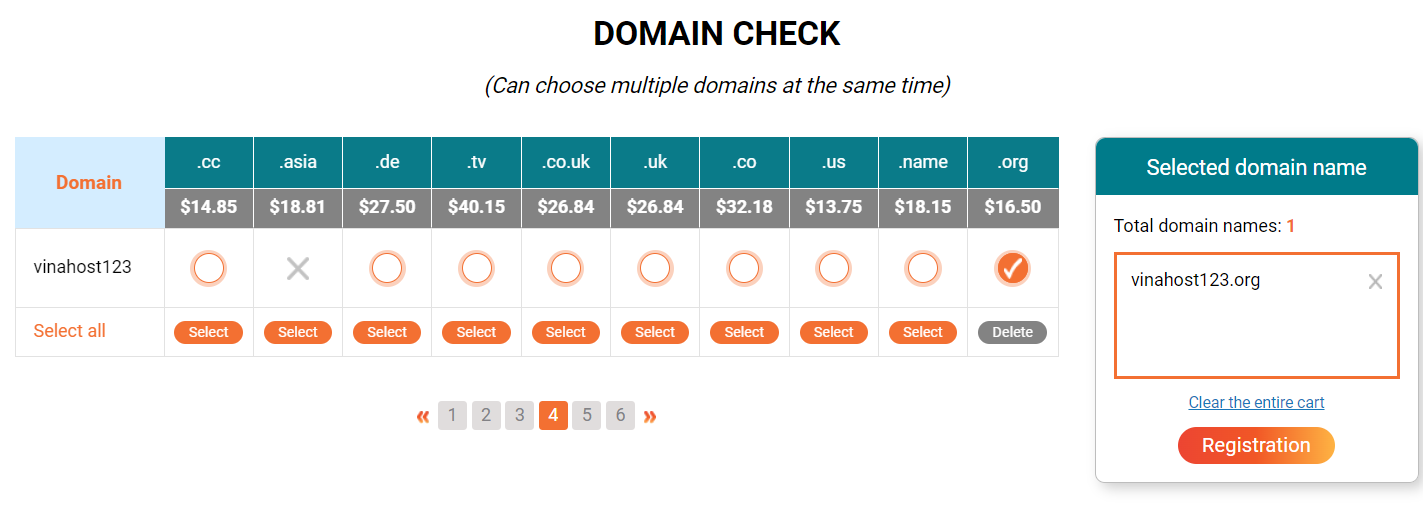
Step 2: Fulfilling Information
For individual registrations, commence by choosing the registration type as “Individual” and then proceed to input the necessary particulars:
- Full Name
- ID Card or Passport Number
- Gender
- Date of Birth
- Complete Address, adhering to standard formatting encompassing country, state/province, city, postal code, and street address
- Email Address
- Phone Number
When registering multiple domain names under the same individual, efficiency can be achieved by entering this information once during the initial registration. For subsequent registrations, simply opt for “Same as…” to automatically populate the details.
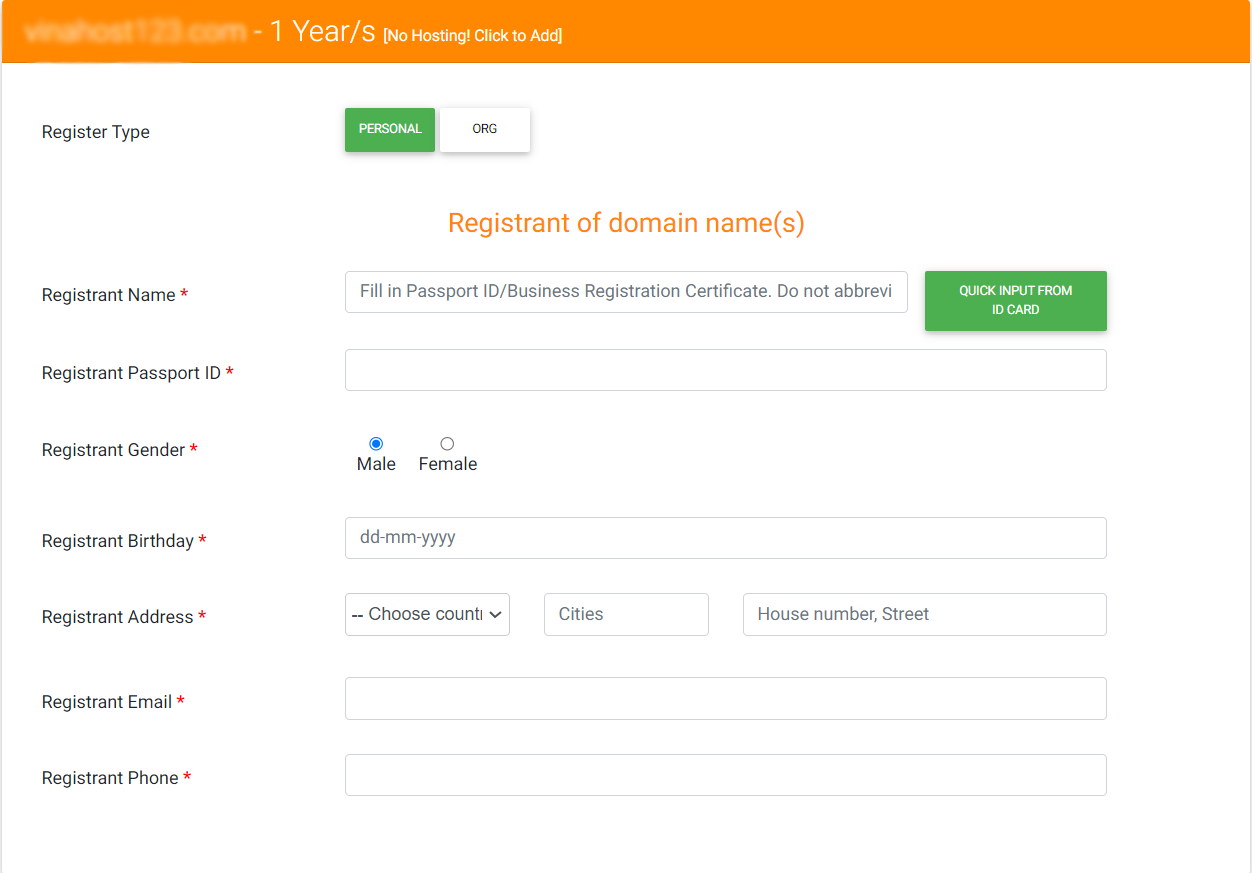
When signing up for organizations, specify the registration type as “Organization” and proceed to complete the requisite fields with the following details:
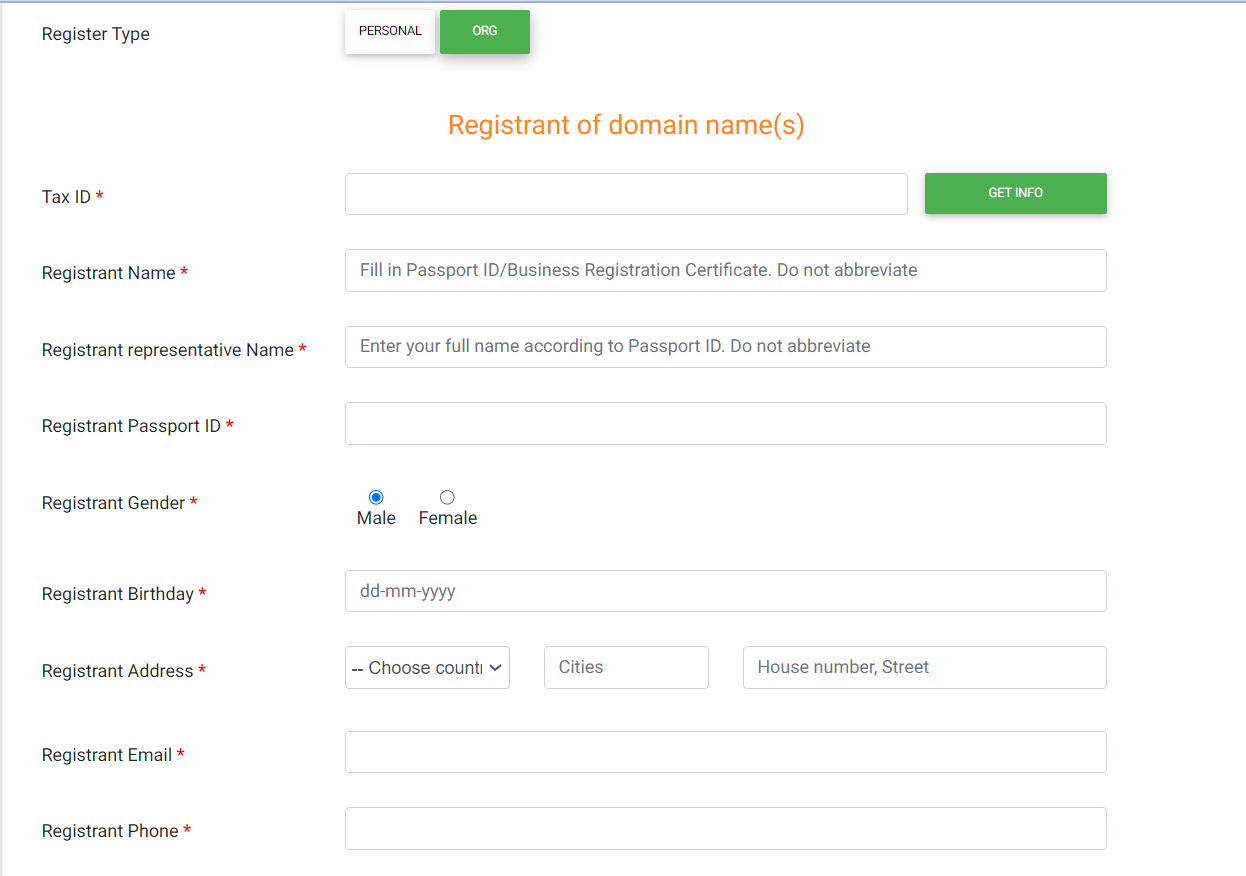
Kindly supply additional details, including the representative’s ID card or Passport number, select gender, date of birth, phone number, and email.
Once all essential information for the Domain Registration Entity is provided, the system will autonomously populate data for the Domain Manager and the Organization Representative during the domain registration process. You retain the option to revise any information if necessary.
Step 3: Payment
Review the order details and input any promotional code you possess.
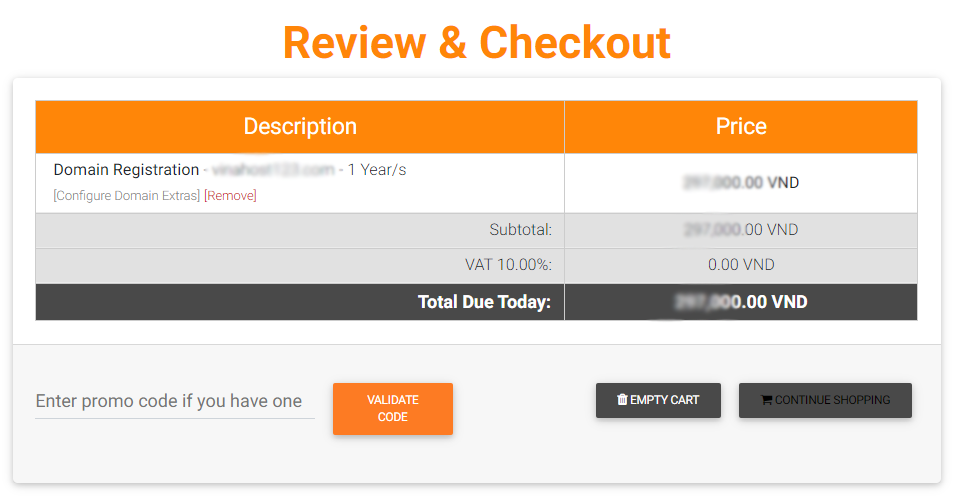
If you’re new to the service and haven’t yet registered an account, VinaHost will prompt you to furnish details to create one. Essential information includes your Full Name, Email, Phone Number, Address, Password, and a security question.
Moreover, you can input information for invoice issuance if required and choose a suitable online payment method. Alternatively, you have the option to make payment directly at the VinaHost Office situated at Cuu Long Apartment, 351/31 No Trang Long, Ward 13, Binh Thanh District, Ho Chi Minh City (Gate B of Pham Van Dong street).
Step 4: Complete entity verification to enable domain name usage
Access to the service management page on VinaHost: https://secure.vinahost.vn/ac/clientarea.php?language=english
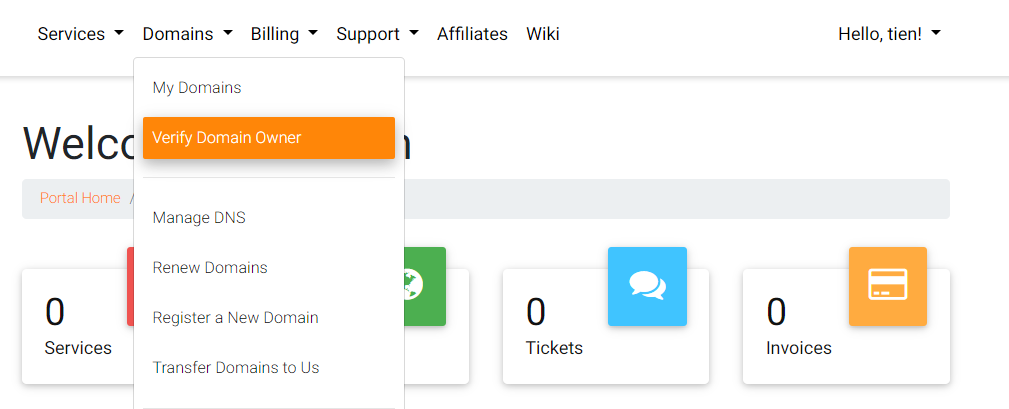
Access the Verify Domain Owner option within the main menu. In the Entity Verification section, you’ll find a list of domain name profiles requiring updates. If you require further assistance in providing information, feel free to reach out to VinaHost’s customer care team.
Contact Information:
- Email: support@vinahost.vn
- Hotline: 1900 6046
- Livechat: https://livechat.vinahost.vn/chat.php
Please note that VinaHost conducts checks and verifies domain name profiles during administrative working hours.
8. Compare .org Domain vs. .Com Domain
The .org and .com domains are among the most popular domain extensions, each serving distinct purposes and audiences.
| .org | .com | |
| Purpose | Originally intended for non-profit organizations, but now commonly used by various entities, including non-profits, communities, educational institutions, and open-source projects. | Originally intended for commercial businesses but has become the default choice for most websites, regardless of their purpose. |
| Perception | Often associated with organizations, charities, and causes. It may convey a sense of credibility, trustworthiness, and purpose-driven initiatives. | Typically associated with commercial enterprises. It’s seen as universal and versatile, suitable for businesses of all sizes and industries. |
| Availability | Generally, there are fewer .org domain registrations compared to .com, but availability can vary depending on the specific domain name. | It’s the most widely used domain extension, leading to greater competition for popular domain names and potentially higher registration costs. |
| SEO and Branding | While there’s no inherent SEO advantage to using .org over .com, it may appeal more to certain audiences or convey a specific mission-driven message. | Widely recognized and trusted, often considered more memorable for users and more favorable for branding purposes. |
| Price | Prices for .org domain registrations can vary but are generally in a similar range to .com domains. | Prices for .com domains can vary depending on factors such as popularity, length, and registrar, but they are generally widely available and competitively priced. |
In summary, while both .org and .com domains have their unique characteristics and advantages, the choice between them depends on factors such as the nature of the website, target audience, branding goals, and availability of desired domain names.
Also Read: What is domain .com? | Overview of domain names .com
9. The Future of .org Domains
In 2019, there was significant controversy when the Internet Society, which owned Public Interest Registry (PIR), announced plans to sell PIR to Ethos Capital, a private equity firm. Many organizations and individuals voiced concerns that this move would lead to increased costs and reduced protections for non-profit organizations that heavily rely on .org domains. After facing significant backlash, the deal was eventually called off in 2020.
However, the controversy sparked discussions about the governance and stewardship of .org domains. Many advocated for more transparency and accountability in the management of these domains to ensure they continue to serve the interests of non-profit organizations and the broader public good.
Moving forward, it’s essential for ICANN, PIR, and other stakeholders to continue engaging with the community to develop policies that uphold the integrity and accessibility of .org domains for non-profit entities. This might involve implementing safeguards to prevent future attempts at privatization or ensuring that pricing remains reasonable and predictable for non-profits.
Overall, while the specific trajectory of .org domains is uncertain, there’s a strong emphasis on maintaining their status as a trusted and accessible domain space for non-profit organizations around the world.
Also Read: What is Transfer Domain? & How to Transfer a Domain?
10. FAQs
10.1. Are there any restrictions on who can register a .Org domain?
Unlike some other top-level domains (TLDs) like .gov or .edu, which are restricted to government and educational institutions respectively, .org domains are open for registration to anyone, regardless of their organizational structure or purpose.
Originally intended for non-profit organizations, .org has historically been associated with entities that operate for the public good, such as charities, NGOs, community groups, and other non-commercial entities. However, over time, the use of .org domains has broadened to include a wide range of organizations, including for-profit businesses and individuals.

10.2. Can a for-profit business benefit from using a .Org domain?
While .org domains were originally intended for non-profit organizations and are still commonly associated with them, there’s technically no restriction preventing for-profit businesses from using a .org domain. However, whether a for-profit business can benefit from using a .org domain depends on various factors, including branding, marketing strategy, and the perception of the domain extension by the target audience.
Also Read: What is .us domain? | Overview of domain names .us
10.3. How does a .Org domain impact SEO (Search Engine Optimization)?
The impact of a .org domain on SEO (Search Engine Optimization) is not directly tied to the domain extension itself but rather to the overall quality and relevance of the website’s content, structure, and backlink profile. However, there are some indirect factors to consider when evaluating the potential SEO impact of a .org domain:
- Perception and Trust: While domain extension itself is not a direct ranking factor, users may perceive .org domains as being associated with non-profit organizations and causes. If your website’s content aligns with this perception, it may positively influence user trust and engagement, indirectly impacting SEO metrics such as click-through rates and dwell time.
- Keyword Usage: The keywords used in the domain name can influence SEO. If the keywords in the .org domain are relevant to the website’s content and target audience, it can potentially improve search engine visibility for those keywords. However, this benefit applies to any domain extension, not just .org.
- Backlinks and Authority: The authority and relevance of the website’s backlink profile play a significant role in SEO. If other reputable websites link to your .org domain, it can enhance your site’s authority and improve search engine rankings. Non-profit organizations often have opportunities to earn high-quality backlinks from authoritative sources within their niche.
- Content Quality and Relevance: Search engines prioritize high-quality, relevant content that provides value to users. Regardless of the domain extension, focusing on creating informative, engaging, and shareable content is crucial for SEO success. Non-profit organizations may have unique opportunities to produce content that resonates with their audience and attracts natural backlinks.
- User Experience: A .org domain does not directly impact user experience, but factors such as website speed, mobile-friendliness, and ease of navigation are critical for SEO. Ensure your website provides a positive user experience across devices and platforms.
While a .org domain can potentially influence user perception and trust, its direct impact on SEO is minimal compared to other factors such as content quality, backlinks, and user experience. By focusing on creating valuable content, earning quality backlinks, and providing a positive user experience, websites can achieve strong SEO performance regardless of their domain extension.
10.4. Is a .org domain free?
.org domains are not typically free. Like most domain extensions, .org domains are managed by domain registrars, and individuals or organizations must pay a registration fee to obtain and use them. The cost of registering a .org domain can vary depending on the registrar, the length of the registration period, and any additional services or features included in the registration package.
Also Read: What is a .top domain? | Overview of domain names .top
11. Conclusion
Through the article “what is .org domain?”, it is hoped that readers will gain a better understanding of the .org domain, its origins, and how it has become a symbol of commitment to social goals and community service. The .org domain plays a crucial role in creating an online space for nonprofit organizations, social enterprises, and community-oriented projects.
If you have any questions that need clarification, please don’t hesitate to contact us.
- Email: support@vinahost.vn
- Hotline: 1900 604
- Livechat: https://livechat.vinahost.vn/chat.php
You can also check out other interesting articles HERE to stay updated with new knowledge every day.
What is domain .info? | Overview of domain names .info
What is edu.vn domain? | Overview of domain names .edu.vn
What is domain .com.vn? | Overview of domain names .com.vn
What is a Subdomain? Exploring the Difference Between Domains & Subdomains














